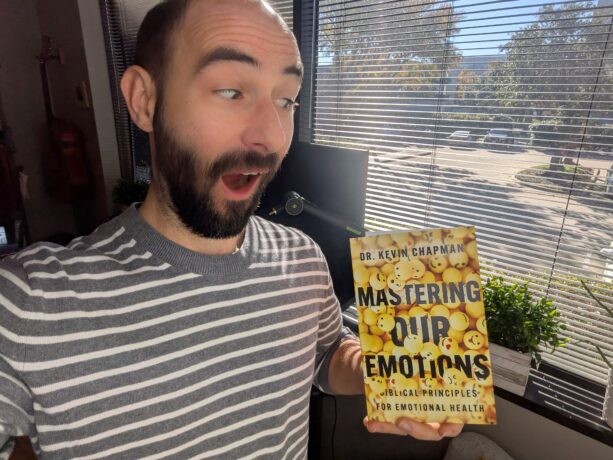
This four part series is meant to be a brief, yet fairly comprehensive, overview into the world of uncertainty for Christians. SUMMARY:
-
-
- In Part 1, uncertainty is explored as a human experience- one for which Christians do not escape simply in lieu of being a faithful follower.
- Part 2 addresses what ways people generally handle uncertainty. Broad definitions are given alongside clinical considerations for Intolerance of Uncertainty (IU), finished with a strong exhortation that faith does not equal certainty- faith is more robust than being some fake “feel-good” tool.
- Part 3 provides a framework and evidence for the need to embrace uncertainty, through faith.
- Part 4 launches us into the incredible Good News- and includes a worksheet to help you face uncertainty in your own life.
-
Uncertainty Can Be Utterly Uncomfortable (Part 1/4)
Let Him Who Is Without Sin Cast The First Stone
Uncertainty can be utterly uncomfortable. One of those days for me was during Bible study in Seminary.
Have you heard where a woman who was condemned for adultery was about to be stoned under the Law? She received mercy from Jesus after he is famously quoted as saying,
“Let him who is without sin among you be the first to throw a stone at her” (John 8:7b).
It probably wasn’t in the original Scriptures.
That Passage About Stones “Rocked” My World
What?!! This rocked my world when I first studied it. It made me nervous based on all my bright-eyed, young assumptions of Bible reading- namely that we are certain about every key detail in the Bible! I still haven’t lost my deep belief in Jesus and in the inerrancy, inspiration, and authority of Scriptures. Actually, it’s even stronger today. But there was a gap between my expectation and reality.
There is a note in most translations, that says
“[The earliest manuscripts donot include 7:53–8:11.]” (ESV.)
Deeper study reveals the awkwardness is real. Most people just tolerate the uncertainty of not knowing (and I also love the HONESTY of Bible Translators putting this as a footnote in almost every translation for us to know that we don’t know!).
Selah
Let’s take one more example: “Selah.” Psalm 62:8 says,
“Trust in him at all times, O people; pour out your heart before him; God is a refuge for us. Selah”
This Hebrew word, Selah, is used 71 times in Psalms and there are 3 occurrences in Habakkuk. But….we don’t know what it means. Really? Yep. It could mean “silence” or “pause”, could be a musical notation, or the modern equivalent of “amen” / praise. Maybe it means lunch break (ha!). But it is a mystery. How can a word used this much- especially in key passages- be a mystery?
Feelings Of Uncertainty For ALL
Before we understand more about what Scriptures say, let’s just acknowledge right now that uncertainty is part of the human experience. None of us have to look far to find something that feels uncertain:
- Pandemic and human behavior during it? ✔️
- How your family holidays will go? ✔️
- What will happen to your finances, investments, or in the future? ✔️
- Could you have handled that situation better with a loved one? ✔️
- Will your child grow up to be responsible and mature, and well-adjusted? ✔️
- Will you be able to get what you want out of your job? ✔️
- Will that college degree really help you? ✔️

A great definition of uncertainty (Mushtaq et al., 2011) is:
“Uncertainty is generally seen as a realization that our beliefs and representations of the world are unable to accurately predict future events in our environment.”
In other words, WE DON’T KNOW.
What If?
As a clinician, one of the most notorious underlying struggles for most clients is uncertainty. It typically centers on one little question:
- What if?
-
- Other iterations include:
- Why?
- I don’t know!
- What does this mean?
- How could this happen?
- Other iterations include:
Uncertainty is Especially Uncomfortable When You Have Anxiety or OCD
Beyond typical suffering that the average person faces with this seminal topic, sufferers of Generalized Anxiety Disorder and OCD take it a big step further and experience one or all of the following quite severely:
- Doubt
- Indecision
- Lack of perceived confidence or peace
- Trouble “shifting gears” to move on from tasks most assume to be routine
- Challenges in automating various situations most people take for granted
In therapy, quashing the pathological pursuit of certainty leads to symptom improvement and many times makes the difference between being severely impaired or not.
Google Reveals Our Hearts- WE WANT CERTAINTY
One bridge between human experience and the Bible is Google. In my search online for “bible verses on uncertainty,” I found it almost humorous that Google brought up the following articles right away:
- “10 Bible Verses for When Life is Uncertain.”
- “13 Scriptures to Meditate on When Your Future Is Uncertain”
- “10 Verses to Help in Times of Uncertainty.”
- “5 Ways to Fight Fear and Uncertainty”
Why did I find this humorous? I had to scroll through a slew of google results- even going to additional pages (who does that?!) before I found a single search result even suggesting tolerating uncertainty. They were all about FIXING it. The one I found was entitled “Can You Bear Uncertainty?”
You might also see from the examples I listed that most of the initial search results have some catchy title with a number of steps / verses to help overcome uncertainty. My search is not a research experiment by far, but I think this truly is a good reflection of the human heart.
Living with uncertainty is a hard thing that requires discipline- you won’t find a single psychology bestseller along these lines. It’s. NOT. Easy.
Pathological (disordered) certainty-seeking, I believe, by and large comes down to seeking a feeling. When we feel “off,” isn’t it hard to say, “Okay, I don’t feel right, but I’ll take this by faith?”










Leave a Reply